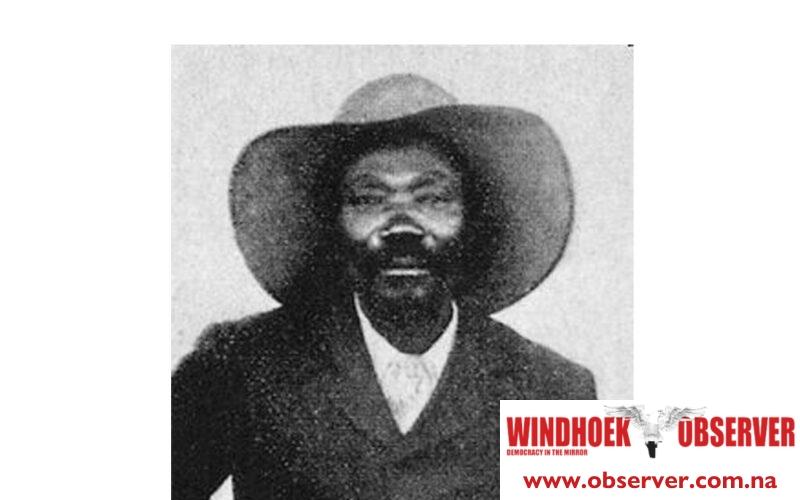Stefanus Nashama
The City of Windhoek was unable to locate the family of one of the nation’s heroes, Jacob Marenga, better known as Jakob Marengo, to honour him during the recent street renaming and naming ceremony.
In Otjiherero, “Marenga” means “kings.”
Seventeen streets were renamed, and others were named after notable individuals, including Marengo.
Relatives and friends of those named after the street delivered mini-eulogies on their behalf.
When it was Marengo’s time, no one was present to talk about him.
The City of Windhoek’s spokesperson, Harold Akwenye, confirmed Marengo’s lack of representation.
“Despite considerable efforts, we were unable to successfully trace immediate members of Mr. Marenga’s family in time for the ceremony,” he said.
Akwenye emphasised that Marengo was not the only one without representation.
“It is important to note that Mr. Marengo was not the only honoree not represented by an immediate family member at the event. We did, however, ensure that the significance of his contributions was duly acknowledged during the ceremony,” he stated.
He clarified that the policy for honouring public members through street naming guided the submission of the request to rename a street in Marengo’s honour.
He added that the proposal underwent a thorough evaluation and received approval in accordance with the established procedures for such recognitions.
Marengo was shot and killed in a battle between his forces and the combined German and South African forces on 20 September 1907 at Eenzaamheid.
A granite tombstone with his name and portrait honours him.
A statue of Marengo is located at the Warmbad cemetery in the southern part of Namibia.
Jakob Marengo Secondary School and Tutorial College in Windhoek’s Katuturab is also named after him.
The late Ottilie Schimming Abrahams founded the school in 1985 to serve young people who planned to attend regular high school but had aspirations to complete their secondary education.
She was the principal of the school until she died in 2018.
Marengo was the chief leader in the insurrection against the German Empire between 1904 and 1908, best known for allying with the rival Herero and Namaqua tribes.
Marengo is one of nine national heroes of Namibia who were identified at the inauguration of the country’s Heroes’ Acre near Windhoek. At the time of its inauguration on 26 August 2002, Founding President Sam Nujoma said: “Born of a Herero mother and a Nama father, Marengo had a vision of broad African nationalism which transcended narrow ethnic loyalties and was therefore designated as ‘the man of the future’. He employed scientific guerrilla tactics with the multi-ethnic troops under his command and engaged the German colonial army in more than fifty battles. To his revolutionary spirit and his visionary memory, we humbly offer our honour and respect.”
Historian at the University of Namibia, Kletus Likuwa, said the honouring of Marengo without representation of his family members is an oversight.
“I think it has to do with the linking of leadership from generation to generation because if Marenga’s leadership has been passed from one generation to the other, that would make it easy to identify relatives of Marenga’s family,” he stressed.
Likuwa said that everyone would expect his descendants to be represented due to his historical role and leadership, which he said should be linked to the current generation.
“This makes it easy for us to find more information from family members when we want to restore the honour of our heroes,” he said.
Sin Street in Katutura was renamed in honour of Ulrich Paulino, a young man who fled into exile in 1988 and never came back.
His brother, Erich Erwin Paulino, commended the city of Windhoek for honouring Ulrich.
His whereabouts could not be established.
“Renaming a street after our brother means a lot to me and my family. I am 100 percent happy with what the City of Windhoek did. Such an honour,” he said.
Despite this honour, Erich said they needed someone to explain what happened to his brother.
“He was received by Swapo, my party, that I will never leave until my last days of life. We know it was a time of war, which was between the South African Regime and the Swapo. Swapo is the one we should ask. At least even to show us where his grave is,” he said.
According to Erich, his brother disappeared when the enemy was searching for him due to his involvement in the mobilisation to combat the enemy.
“The enemy came and broke my mother’s house. By that time, he ran away, and we never saw him again. My mother was always asking when his son was coming back or even just to see where his grave was, but it could not happen until he died,” he said.
He said he had applied for his brother to be named a street in 2018.
“I thank the City of Windhoek for that long discussion after six years of applying. I am very happy for them, which reflects an hour on our brother,” Erich said.




